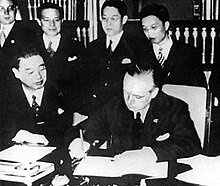Mushanokōji Kintomo
Kintomo Mushanokōji ( jap. 武者小路公共 * 29. August 1882 , † 21st April 1962 ) was Japanese special envoy and signed for the Japanese Empire in 1936 against the Soviet Union directed anti-Comintern pact between the Empire of Japan and the German Reich .
The writer Mushanokōji Saneatsu was his younger brother.
biography
Mushanokōji Kintomo was born in 1882 in the Kōjimachi district of Tokyo as the third son of the Mushanokōji family, which has been noble for ten generations. His father Saneyo had studied in Berlin as part of the Iwakura mission from 1873. On October 27, 1887, at the age of five, Kintomo was awarded the nobility title of Shishaku (i.e. vice-count ).
He graduated from the Law Faculty of the Imperial University of Tokyo (Teikoku Daigaku), today's Tōkyō Daigaku . He then made a career as a political official of the Japanese Empire.
In 1930 he was a member of the Japanese delegation to the eleventh ordinary meeting of the League of Nations and also took part in a special working group initiated by China. From 1929 to 1933 he was the Japanese ambassador for Sweden and Finland based in Stockholm . In this capacity he also signed a legal treaty between Japan and Sweden.
From 1934 to 1937 he was the Japanese ambassador to Germany . On November 25, 1936, in Berlin, he signed the secret treaty, the Anti-Comintern Pact, which was directed against the Soviet Union and initially limited to five years. Foreign Minister Joachim von Ribbentrop signed for the German side . On May 24, 1937, Mushanokōji Kintomo was received by Adolf Hitler in the Reich Chancellery as part of the Anti-Comintern Conference, which was also attended by Italy .
After the Second World War, he was removed from his public office by the occupation authorities. With the entry into force of the new Japanese constitution in 1947, like all other nobles outside the imperial family, he lost his rank of nobility. In contrast to most ex-nobles, Mushanokōjis as well as Matsudaira / Tokugawa and Madenokōji are still recognizable by their names as former (court) nobles ( Kuge ).
From 1952 to 1955 he was chairman of the Japanese-German Society in Tokyo .
| personal data | |
|---|---|
| SURNAME | Mushanokōji, Kintomo |
| ALTERNATIVE NAMES | 武 者 小路 公共 (Japanese) |
| BRIEF DESCRIPTION | Japanese special ambassador and signatory of the Anti-Comintern Pact |
| DATE OF BIRTH | August 29, 1882 |
| DATE OF DEATH | April 21, 1962 |
